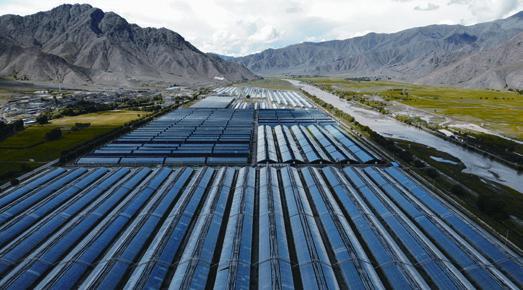HARVESTING A BETTER FUTURE
2020-09-16ByLiXiaoyang
By Li Xiaoyang

Till two years ago, Tenzin was a struggling farmer in Lungsang, a village in the city of Xigaze in Tibet Autonomous Region, southwest China. Lying at an average altitude of 4,000 meters, with long sunshine hours and fertile soil, the area is one of the regions major producers of highland barley. However, the crop had never brought the 75-year-old farmer any sizeable profit in his decades of farming.
His family used it mostly to make tsampa, the traditional Tibetan staple food of roasted barley flour, and sold the rest. Selling was even harder than farming. Tenzin had to rent a truck to take the barley to nearby towns to sell it but would get only a little cash and sometimes, not even that but just sheepskin in barter.
Then in 2016, a private company started up in the neighborhood. Tibet Deqin Sunshine Manor, seeing the potential in highland barley, which is rich in minerals and, among all kinds of wheat, has the highest beta-glucan—sugar content that improves the immunosystem—began to develop diverse barley products such as flour, noodles, biscuits and meal replacement powder, which appeal to non-Tibetan palates as well.
“Our company is now the largest highland barley food processor in Tibet,” Luo Hujie, director of the companys food factory, told Beijing Review.“To expand the market, we are working with research institutions such as the Tibet Academy of Agricultural and Animal Husbandry Sciences.”
Last year, the companys total sales through ecommerce platforms and offline stores amounted to over 20 million yuan ($2.9 million).
Tibet Deqin Sunshine Manor signed contracts with farmers around Xigaze to buy their barley. In 2019, it purchased more than 3,000 tons of barley from them.
Tenzin is among the sellers. He started selling his barley to the new company in 2018 in a win-win deal. The company sends trucks to the farmers to collect the grain while the local government gives them free fertilizer.
In the past two years, Tenzin sold nearly 40 tons to the company at a price higher than the market price, making a total income of nearly 190,000 yuan ($27,566), which is an unprecedented windfall. “I and my family members used to harvest the barley in the past by ourselves,” Tenzin said. “Now we hire a dozen hands since we are planting over a much larger area.”
Overlooked resource tapped
To develop the vegetable industry and alleviate poverty, the local government stepped in. They funded enterprises, announced preferential policies and encouraged collaboration between enterprises and research institutions to improve the product quality. Finally, the collective efforts paid off at the end of 2017, when Bainang was removed from the national list of poverty-stricken counties.
By May this year, over 3,000 households were engaged in the vegetable industry, which had increased the annual income of each household by 30,000 yuan ($4,356) on average. It had also helped over 1,000 people shake off poverty.
The Zhufeng Modern Agricultural Expo Park was built in Bainang in 2019, with the local government funding 35.9 million yuan ($5.2 million). The over 100-hectare park has eight glass greenhouses and 128 plastic ones and produces over 11,000 tons of fruits and vegetables per year on average. The annual output value is more than 50 million yuan ($7.2 million). Today, the park has become a major vegetable and fruit supplier for Xigaze and contributed to poverty alleviation in the area.
As of August, the park had 150 local employees. It had also trained 420 farmers as agricultural technicians. The average monthly salary of the employees is around 5,000 yuan, with free meals and accommodation. In addition, the park rents 100 hectares from nearly 2,000 people from impoverished households, which brings them a collective income of around 3 million yuan ($437,000) at the end of a year.
The Xaitongmoin Biotech Demonstration Zone, a state-owned enterprise in Xaitongmoin, another county in Xigaze, is also a pioneer in vegetable planting. Xaitongmoin was among the last batch of counties and districts in Tibet to shake off poverty in 2019. The demonstration zone started operating the same year and now produces more than 10 types of edible fungi, including king oyster mushrooms and enoki mushrooms, which are sold across Xigaze and Lhasa. It collaborated with research institutions including Hunan Agricultural University and received support from the local government to address technological problems, including lack of electricity in the initial period.
Today, its products have gone into mass production. In the first half of this year, it sold more than 700 tons of king oyster mushrooms, Huang Minfeng, deputy general manager of the company, told Beijing Review. Residues produced in the production process are used as biofuel.
According to Huang, over 60 people from poor households have been employed this year. The demonstration zone also gives free fungi spawns to local farmers, buys their mushrooms and in addition, pays them a bonus from the profit it earns from selling their mushrooms. In the first half of the year, over 560 impoverished families were paid more than 3,000 yuan ($437) each as bonus. “In 2021, we plan to involve more rural households in fungus planting,” Huang said.
(Reporting from Tibet Autonomous Region)
